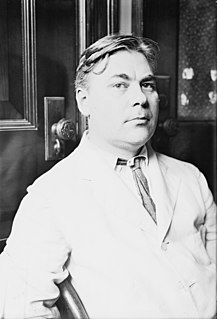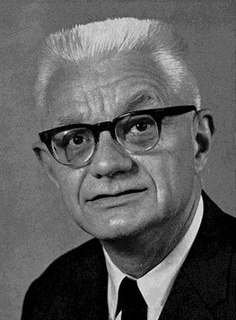A Quote by Frank Herbert
All proofs inevitably lead to propositions which have no proof! All things are known because we want to believe in them.
Quote Topics
Related Quotes
It is a matter for considerable regret that Fermat, who cultivated the theory of numbers with so much success, did not leave us with the proofs of the theorems he discovered. In truth, Messrs Euler and Lagrange, who have not disdained this kind of research, have proved most of these theorems, and have even substituted extensive theories for the isolated propositions of Fermat. But there are several proofs which have resisted their efforts.
Mathematicians are proud of the fact that, generally, they do their work with a piece of chalk and a blackboard. They value hand-done proofs above all else. A big question in mathematics today is whether or not computational proofs are legitimate. Some mathematicians won't accept computational proofs and insist that a real proof must be done by the human hand and mind, using equations.
Mathematics is a logical method. . . . Mathematical propositions express no thoughts. In life it is never a mathematical proposition which we need, but we use mathematical propositions only in order to infer from propositions which do not belong to mathematics to others which equally do not belong to mathematics.
A feeling of alienation existed in India about life in Pakistan because most of what was known was negative. So, everyone used to believe things in our country are always bad, and we don't lead a happy life. But this has changed to some extent. After watching our dramas, people now know that we lead our lives similar to the way they live.
To let them share in the highest offices is to take a risk; inevitably, their unjust standards will cause them to commit injustice, and their lack of judgement will lead them into error. On the other hand there is a risk in not giving them a share, and in their non participation, for when there are many who have no property and no honours they inevitably constitute a huge hostile element in the state. But it can still remain open to them to participate in deliberating and judging.
The propositions of mathematics have, therefore, the same unquestionable certainty which is typical of such propositions as "All bachelors are unmarried," but they also share the complete lack of empirical content which is associated with that certainty: The propositions of mathematics are devoid of all factual content; they convey no information whatever on any empirical subject matter.
It is wrong for a man to say that he is certain of the objective truth of any proposition unless he can produce evidence which logically justifies that certainty. This is what Agnosticism asserts; and, in my opinion, it is all that is essential to Agnosticism. That which Agnostics deny and repudiate, as immoral, is the contrary doctrine, that there are propositions which men ought to believe without logically satisfactory evidence; and that reprobation ought to attach to the profession of disbelief in such inadequately supported propositions.
This report has been difficult to write because it involves something that doesn't officially exist. It is well known that ever since the first flying saucer was reported in June 1947 the Air Force has officially said that there is no proof that such a thing as an interplanetary spaceship exists. But what is not well known is that this conclusion is far from being unanimous among the military and their scientific advisors because of the one word, proof; so the UFO investigations continue.
The mathematician starts with a few propositions, the proof of which is so obvious that they are called self-evident, and the rest of his work consists of subtle deductions from them. The teaching of languages, at any rate as ordinarily practiced, is of the same general nature authority and tradition furnish the data, and the mental operations are deductive.



































